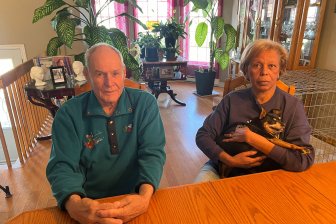Chief and council from the Blood Tribe First Nation, along with community members, physicians and police met with federal health minister Jane Philpott Friday morning to address the ongoing opioid crisis in Canada.

The reserve, located 43 kilometres southwest of Lethbridge, has been making strides to combat the dangerous drug in southern Alberta.
“This problem isn’t a Blood Tribe problem,” said Chief Charles Weaslehead. “It’s a national problem.”
READ MORE: Health Canada approves Naloxone nasal spray to combat ‘opioid crisis’
The opioid fentanyl has been responsible for hundreds of deaths in Alberta since the start of 2015.
After losing 18 residents last year, the Blood Tribe proclaimed a state of emergency in March 2015. Since then, officials have been working tirelessly to combat addiction in the community.
“The Blood Tribe was the first, and perhaps one of the leaders in acknowledging that there was a problem,” Weaslehead said.
The efforts of the Blood Tribe have not gone unnoticed. Philpott travelled to Standoff to speak with community leaders about the exceptional steps that police, tribe officials and health care workers have taken to battle drug addiction.
“To see the determination among these folks, the leaders here, they’re highly professional, and really well prepared,” Philpott said. “They are absolutely determined to respond to this in an effective way.”
READ MORE: Blood Tribe man says drugs, alcohol addictions can be beat
Titus Aragon, 22, is living proof of the life-saving measures the community has undertaken. He was addicted to fentanyl for two years, and tried to quit nearly a dozen times before he sought help from a medical doctor.
“There were so many people waiting for treatment, and I had to wait two months,” Aragon said. “I was ambitious to get off of it, instead of waiting those two months, I went to the doctor and I waited there until she eventually did take me in.”
Aragon said seeking treatment was the best decision he ever made.
It is stories like Aragon’s that show the challenges that communities are facing. The Blood Tribe is doing the best it can with limited resources.
“We’re willing to tackle this,” Weaslehead said. “We’re in it for the long haul, but we need some support.”
READ MORE: Fentanyl 101 – the facts and dangers
The community is confident this session will provide the health minister with tangible facts and information she can use to develop a comprehensive plan that will ultimately save lives.
“There’s much more to be done, but I think they’re in a very good position and will in fact be leaders for the country,” Philpott said.
Friday’s meeting is just the first of many conversations that the federal government plans to have with communities across the country with hopes of ending the fatal cycle of drug abuse.
- ‘Unprofessional’: Couple waits hours at a hospital to see a doctor who wasn’t there
- N.S. mom calls for better ultrasound access after private clinic reveals twins
- 3 women diagnosed with HIV after ‘vampire facials’ at unlicensed U.S. spa
- Solar eclipse eye damage: More than 160 cases reported in Ontario, Quebec




Comments